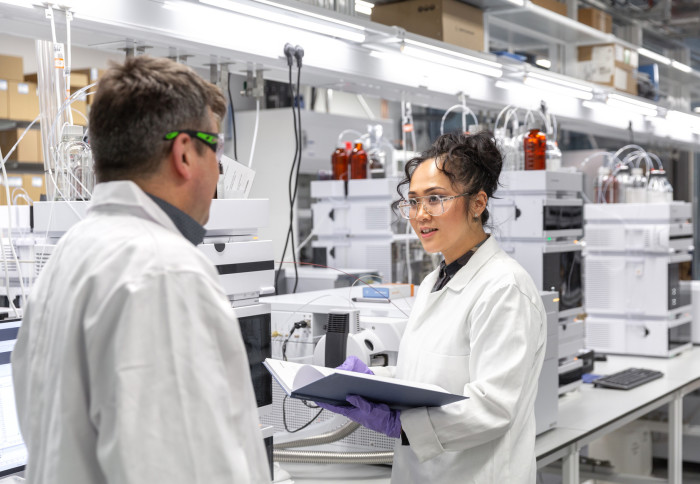Agilent Measurement Suite celebrates early successes

Agilent Measurement Suite
Advanced chemical analysis equipment from Agilent in the Molecular Sciences Research Hub has been helping researchers solve pressing challenges.
Experts in Imperial’s Department of Chemistry have now been using a suite of advanced analytical equipment provided by instrument manufacturer Agilent Technologies for over one year to address real-world challenges in a range of areas including healthcare, biology and environmental health.
By pairing Agilent’s equipment and know-how with the expertise of Imperial’s researchers, we’ve been able to significantly accelerate our fundamental research and drive new technical applications. Professor Oscar Ces Head of the Department of Chemistry
With state-of-the-art equipment worth £4 million, the Agilent Measurement Suite has helped researchers evaluate methods for delivering therapeutics to the brain, better understand the composition of interstitial fluid - a liquid under the human skin that contains biomarkers that can be used to monitor human health - and assess the presence of arsenic in drinking water.
These are among over 100 projects that have been carried out by four different Imperial departments, two Imperial startups and a number of commercial clients using the analytical services available through the Suite, with support from Imperial analytical science experts and training and proprietary know-how provided by Agilent as part of its partnership with Imperial.
Expanded capabilities

Professor Oscar Ces, Head of the Department of Chemistry at Imperial, said: “The introduction of the Agilent Measurement Suite has significantly expanded Imperial’s capabilities in chemical analysis, and, as the metrics from its first year of operation show, these are being put to good use.
In one case, a paediatrician working in West Africa contacted the Department of Chemistry about analysing traditional African herbal remedies that he suspected had been adulterated.
“By pairing Agilent’s equipment and know-how with the expertise of Imperial’s researchers, we’ve been able to significantly accelerate our fundamental research, drive new technical applications and improve our understanding of chemical processes in the life sciences, agri-sciences and other disciplines. We’ve also been able to carry out key projects with Imperial teams and external organisations that have had very immediate benefits in the real world. As such the Agilent Measurement Suite has played a pivotal role in supporting the exciting innovation district that is blossoming at the White City Campus.”
Maria Angeles Diaz, EMEA and India Sales Vice President & General Manager at Agilent Technologies, said: “Celebrating one year since the official opening of the Agilent Measurement Suite at Imperial’s new White City Campus, we are so impressed with how well the facilities are already being used.
“Through the number and variety of successful research projects, covering not only the life sciences, but also applied markets, the AMS has proven itself to be an ideal stage to bring together scientific expertise from both industry and academia in an exchange of ideas to address analytical problems through this state-of-the-art facility. We look forward to continuing the partnership with Imperial College London and working together on bringing more solutions and innovation to the scientific community.”
Herbal remedies
The Agilent Measurement Suite is being used to offer analytical services both to the Imperial community and to academic researchers, businesses, healthcare providers and other organisations around the world.
In one case, a paediatrician working in West Africa contacted the Department of Chemistry about analysing traditional African herbal remedies that he suspected had been adulterated with pharmaceuticals as young children in his clinic were showing symptoms consistent with this.
Dr Trevor Ferris, Facility Manager at the Suite, obtained several samples of the herbal materials and using the advanced capabilities in the Suite set about determining which, if any, adulterants were present. He used the literature to build a database of known adulterants and worked with an Agilent applications specialist to use sophisticated chemometrics to carry out a comparison of the different herbal samples. A number of possible ‘hits’ were identified and researchers are now in the process of confirming their identity, with the aim of gathering information that can be used to guide treatment.
Dr Ferris said: “This has been a very exciting project and I am delighted that we have been able to identify potential adulterants for further analysis. The facilities within the Agilent Measurement Suite allowed me to translate my forensic science skills into a detailed and prompt response to the initial enquiry, and I look forward to working with new clients in the future.”
Professor Tony Cass, Director of the Agilent Measurement Suite, said: “This is just an example of how, with access to Agilent’s advanced instrumentation and data analytics expertise, we’ve been able to undertake research with important real-world benefits. I’m confident that with access to the Suite many researchers, from Imperial and beyond, will continue to produce many more examples in the years to come.”
Article text (excluding photos or graphics) © Imperial College London.
Photos and graphics subject to third party copyright used with permission or © Imperial College London.
Reporter
David Silverman
Communications Division